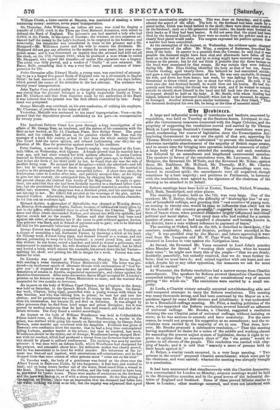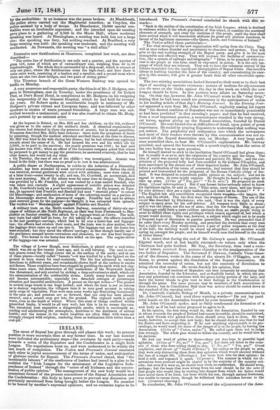ebe Wrobintes.
A large and influential meeting of merchants and bankers, convened by requisition, was held on Tuesday at the Sessions-house, Liverpool, to con- sider the Government measures connected with the Sugar Colonies, and the propriety of supporting the resolutions moved and carried by Sir Thomas Birch in Lord George Bentinok's Committee. Four resolutions were pro; posed, condemning the course of legislation since the Emancipation Act; imploring Government to carry out the spirit of that act; approving Sir Thomas Birch's resolutions, as calculated " to prevent the immediate and otherwise inevitable abandonment of the majority of British sugar estates, and to secure time for bringing into operation intended measures of relief." A large body of Free-traders attended the meeting, and each resolution was followed by an amendment and lengthened controversial speeches. The speakers in favour of the resolutions were, Mr. Lawrance, Mr. Adam Hodgson, the Revererid Dr. M`Neile, and the Reverend Mr. Nolan; against them, Mr. Rathbone' Mr. Holland, Mr. Thornely, M.P., Mr. Charles Robertson, and Mr. William Brown, M.P. The proceedings were con- ducted in excellent spirit; the amendments were all negatived, though sometimes by a bare majority; and petitions to Parliament, in harmony with the resolutions, were agreed to, the signature of the chairman of the meeting to be attached in its behalf.
Reform meetings have been held at Exeter, Taunton, Oxford, Worcester, Hull, Bath, Sunderhu3d, and other places.
The meeting at Exeter, held on the 7th, was very large. One of the speakers, Mr. T. Besley, feeling the difficulty of " drawing'the line " at any sort of household suffrage, and granting that " vast numbers'of young men, on coming to twenty-one, would be open to influences that cfittld not be for the benefit of the country generally," suggested ttreturn to the prac- tices of' Saxon times, when personal character largely-influenced individual political and social status. "tot eye*, man who bad resided for a certain number of years, and so had acquired a character and become known in his district, have a vote without reference to payment of taxes."
The meeting at Oxford, held on the 8th, is described to larve.heenot for numbers, unanimity,&der, and decision, perhaps never exceeded in the city." It was presided all. by the Mayor; and letters approving it were read from Mr. Langston and Mr. W. Page Wood, the borough Members, detained in London to vote against the Navigation-laws.
At Stroud, the Reverend Mr. Yates recurred to Lord John's practice when Member for Stroud, of "wanting their opinions, when he wanted their votes ": he might now learn this of the people—" ;hat we are firmly, decidedly, peacefully, but unitedly resolved, that we do want farther-re- form; that we must have it; and, united together with one heart and one mind, despite his or any other opposition, the measures we ask for must and will be carried."
At Worcester, the Reform resolutions had a narrow escape from Chartist amendments. The speakers for Reform avowed themselves Chartists, but counselled taking the "four points," as the constitutional way of soonest getting " the whole six." The resolutions were carried by a small ma- jority.
At Leeds, a Chartist victory actually occurred notwithstanding able and well-tempered attempts to carry the Reform resolutions. The meeting was many thousands strong, and had been convened by the Mayor on a re- quisition signed by some 1,600 electors and inhabitants: it was understood to be a Household-suffrage meeting. Mr. Plint, a leading politician of the town, who supported the Reform resolutions, avowed himself an adherent of universal suffrage. Mr. Brooke, a Chartist, suggested a resolution claiming the one Chartist point of universal suffrage, without insisting on more; as he was anxious to concede and have unanimity. For the same reason, he would not propose his suggestion as an amendment; and the re- solutions were carried by the majority of six to one. That done, how- ever, Mr. Brooke proposed a substantive resolution,—" That this meeting having manifested its desire for a union of the middle and working classes for amending the present unjust system of legislation, deems it right to ex- press its opinion that no measure short of" the " six points" would do justice to all classes of the people. This resolution was carried with clap- ping of hands; and it is said that " scarcely a score of persons held up their hands against it."
At Belper, a similar result occurred, in a very large meeting. " Two persons in the crowd" proposed Chartist amendments; which were put by the chairman, and were carried: whereat the meeting was abruptly brought to a conclusion.
It had been announced that simultaneously with the Chartist demonstra- tion contemplated for London on Monday, monster meetings would be held
in the Metropolitan counties, and in the great of the industrial dis- tricts of England and Scotland. Some of these proved failuies similar to those in London; other meetings occurred, and were not interfered with by the authorities: in no instance was the peace broken. At Blackheath, the police alone carried out the Magisterial interdict; at Croydon, the police assisted by a body of troops. At Manchester, 10,000 special con- stables were an irrefutable argument; and the intended open-air meeting gave place to a gathering of 2,500 in the Music Hall; where moderate speaking was heard. At Birmingham, a meeting was held, but not a large one: the speaking was fiery, but nothing resulted. At Bradford, a very large meeting was held: the speaking was moderate, and the meeting well conducted. At Newcastle, the meeting was "a dull affair."
Extensive new fortifications at Sheerness, completed last week, are thus described-
" The entire line of fortification is one mile and a quarter, and the number of guns 118, some of which are of extraordinary size, weighing from 80 to 90 hundredweight. The whole line is surrounded by a deepmoat, which is crossed at
o nly one place, where the fortifications cross the high-road; and here there is some outer work, consisting of a bastion and a raveline, and a second moat where there are also two draw-bndges, and two pairs of strong gates."
The Tiverton branch of the Great Western Railway was opened for triffic on Monday.
A very numerous and respectable party, the friends of Mr. J. Hodgson, sur- geon in Birmingham, met on Tuesday, under the presidency of Sir Robert peel, at Dee's Royal Hotel, in compliment to Mr. Hodgson on his resigning the surgeonship of the General Hospital, which he had held for twenty- six years. Sir Robert spoke at considerable length in testimony of Mr. Hodgson's private virtues and European fame; and was followed by other speakers in strains of warm personal friendship. A large sum was sub- scribed towards a testimonial; and it was also resolved to obtain Mr. Hodg- son's portrait by an eminent artist.
At the inquest in Bristol, on Mrs. Hill and her children, on the 9th, evidence was given as to the cause of the mother's death. A chemical examination of the viscera had detected in them the presence of arsenic, but in small quantities. Witnesses described Mrs. Hill's fatal sickness: there were the symptoms of death by poisoning, though the medical attendant ascribed them at the time to disease. Mr. Hill was kind to his wife during her illness; but he had uttered one equivocal remark about the cause of it. He had insured his own and his wife's life for 2t9991, to be paid to the survivor; the yearly premium was 199L; he had said his income was 100L ; when an officer of the insurance company asked him where he purposed to get money to pay the premiums, he answer evasively, that he had other means, but would not say what.
• On Tuesday, the case of one of the children was investigated. Arsenic was found in the body; but there was no proof as to how it was administered.
A public dinner at Northampton, to celebrate the induction of a Dissenting minister, has been attended by most untoward consequences. Before the cloth was removed, several gentlemen were seized with sickness; more were taken ill at a later hour—some twenty in all; and one, Mr. Courfield, an accountant, died the next morning. Six of the others were for some time in danger. The dinner was provided by a Mr. Franklin, and was cooked by a man named Randall, who was taken into custody. A slight appearance of metallic poison was detected in Mr. Courfield's body on a post mortem examination. At the inquest, on Tues- day, [it appeared that Franklin and Randall had used " emerald green" to colour the blancmange; and analyzation of some of the colouring-matter on a portion of the blancmange showed the presence of copper. Franklin had said he always used emerald green for the purpose—he thought it was extracted from spinach. The verdict was " Manslaughter" agtinst Franklin and Randall. A military train on the North-wesierti ;railway, consisting of thirty-six car- riages of soldiers-of ,the Ninth _Regiment, on ask way.from Portsmouth, to Man- chester on Sunday evening, was struck by a luggage-train at Crewe. The mili- tary train had staid half an hour, for the taking of a meal: the officers travelled in the last passenger-carriage' which had in its rear a horse-box and luggage- van: the officers had retaken their seats? and the train was in slow motion, when the luggage-train came up and ran into it. The luggage-van and the horse-box were smashed; but they saved the officers' carriage; so that though hardly one of the gentlemen escaped severe contusions and abrasions, no one was hurt danger- ously. Two horses in the horse-box were killed on the spot. The engine-driver of the luggage-van was arrested.
The village of Lower Haugh, near Rotherham, is placed over a coal-mine, which was set on fire twenty years ago, and is still burning. The coal in cer- tain places round the village comes out at the surface of the earth; and at one of these places—locally called "bassets "—it was kindled by a fire lighted on the ground to burn stones for road-materials. The fire has advanced in various directions in different years, and occasionally shown itself at the surface in smoke and flames. These eruptions have been stopped by puddling the earth with wet clay. Some years since, the destruction of the mausoleum of the Wentworth family WAS threatened, and only averted by sinking a deep and extensive shaft, which cut the communication of the combustible strata. Lately many houses have sunk and become untenantable; especially two detached cottages of picturesque situation and beautiful architecture. A person on the spot writes—" The ground in several large tracts is one huge hotbed; and where the heat is not so intense as to destroy vegetation, the villagers turn it to very good account in raising early crops of vegetables. Peas were seen some weeks ago flourishing luxuriantly in the open air; and potatoes are so forward, that one crop has been already secured, and a second crop got into the ground. The exposed earth is quite warm, even in the depth of winter. Where this state of things confined within prescribed limits, it would be all very well; but this is by no means the case. The unnatural heat engenders a disagreeable smoke, which is continually as- cending and adulterating the atmosphere, doubtless to the detriment of animal health; and the houses in the worst localities are often filled with warm air strongly charged with sulphur, rendering them as habitations little better than a coal-pit."

























 Previous page
Previous page